What is Garmin Body Battery?
How Garmin tracks your energy levels, why your score is so low, and which Garmin watches measure it.
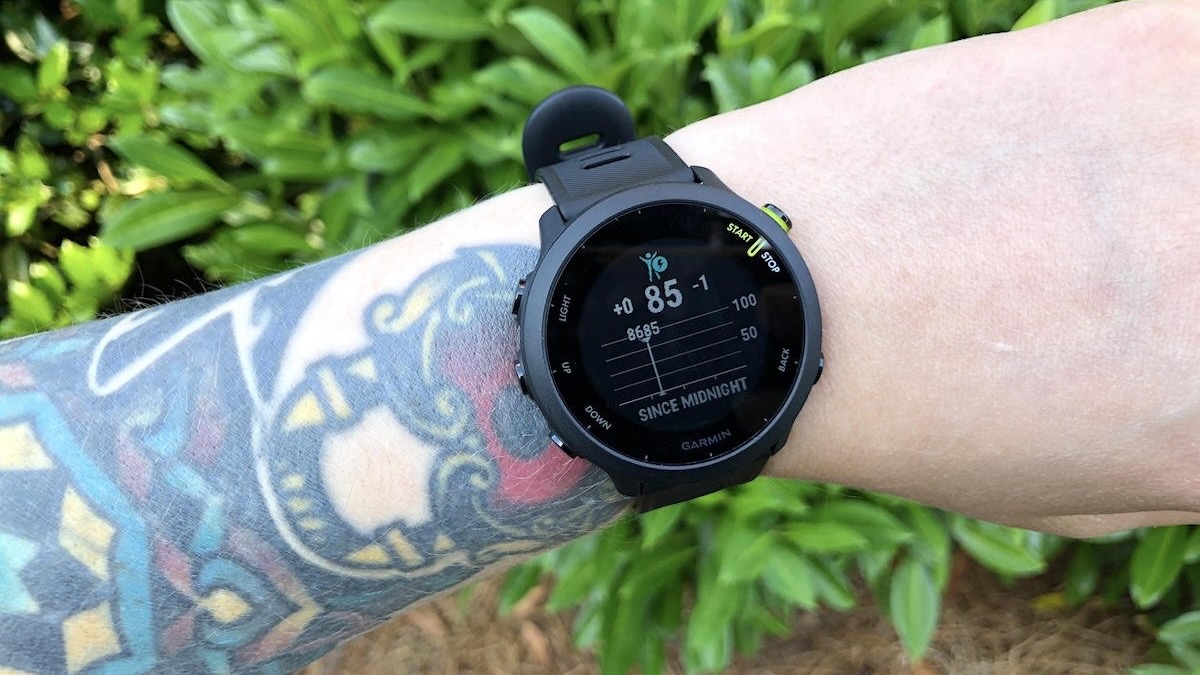
Get the latest news from Android Central, your trusted companion in the world of Android
You are now subscribed
Your newsletter sign-up was successful
What is Garmin Body Battery?
Garmin Body Battery is the fitness brand's proprietary metric for measuring your current energy level based on past workouts, heart rate variability, sleep and stress tracking, diet and hydration, and other information. Most Garmin watches support it, so you can judge how hard to work out on a given day.
Garmin Body Battery, explained
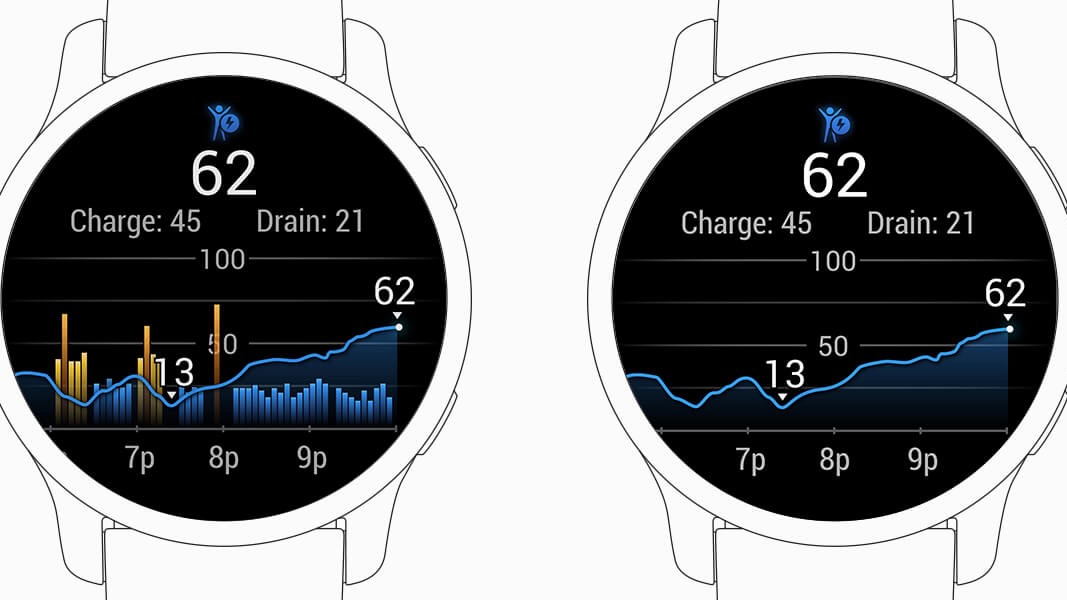
Garmin watches collect an intense amount of data from your body, and not just during workouts. Trends in your heart rate, breathing, stress, and sleep, coupled with metrics like VO2 Max, can tell Garmin exactly what kind of bodily signals you should be giving off in ideal conditions — and what your actual health data signals about your current energy level.
Your Garmin Body Battery score is calculated after about a week of wearing your watch, including at night. At that point, it'll have a baseline of your body's health conditions, so it can estimate your average battery gains and losses even if you take your watch off for a while. Garmin will then need a full day to recalculate your Body Battery score to current accuracy.
Scores are measured between 0 and 100, along with a "Charged" and "Drained" score every day. While you obviously want a high Garmin Body Battery level, it will naturally drain during the day and quickly drain during workouts, especially those with a high training load. Garmin says that ideally, your charge and drain will be the same on a given day; a higher drain is obviously hard on your body, but a higher charge signals you could be working out harder.
In other words, Garmin Body Battery is a fairly common-sense tool; if you're tired, you don't need Garmin's battery score to tell you that. But it will warn you if stress, bad sleep, or overexercising is taking a toll when you might not realize it.
Other fitness brands have an equivalent to this tool; Fitbit has a Daily Readiness Score, for example. But Fitbit charges you a subscription fee to see this data, whereas Garmin provides its Body Battery score for free.
How is Garmin Body Battery calculated?
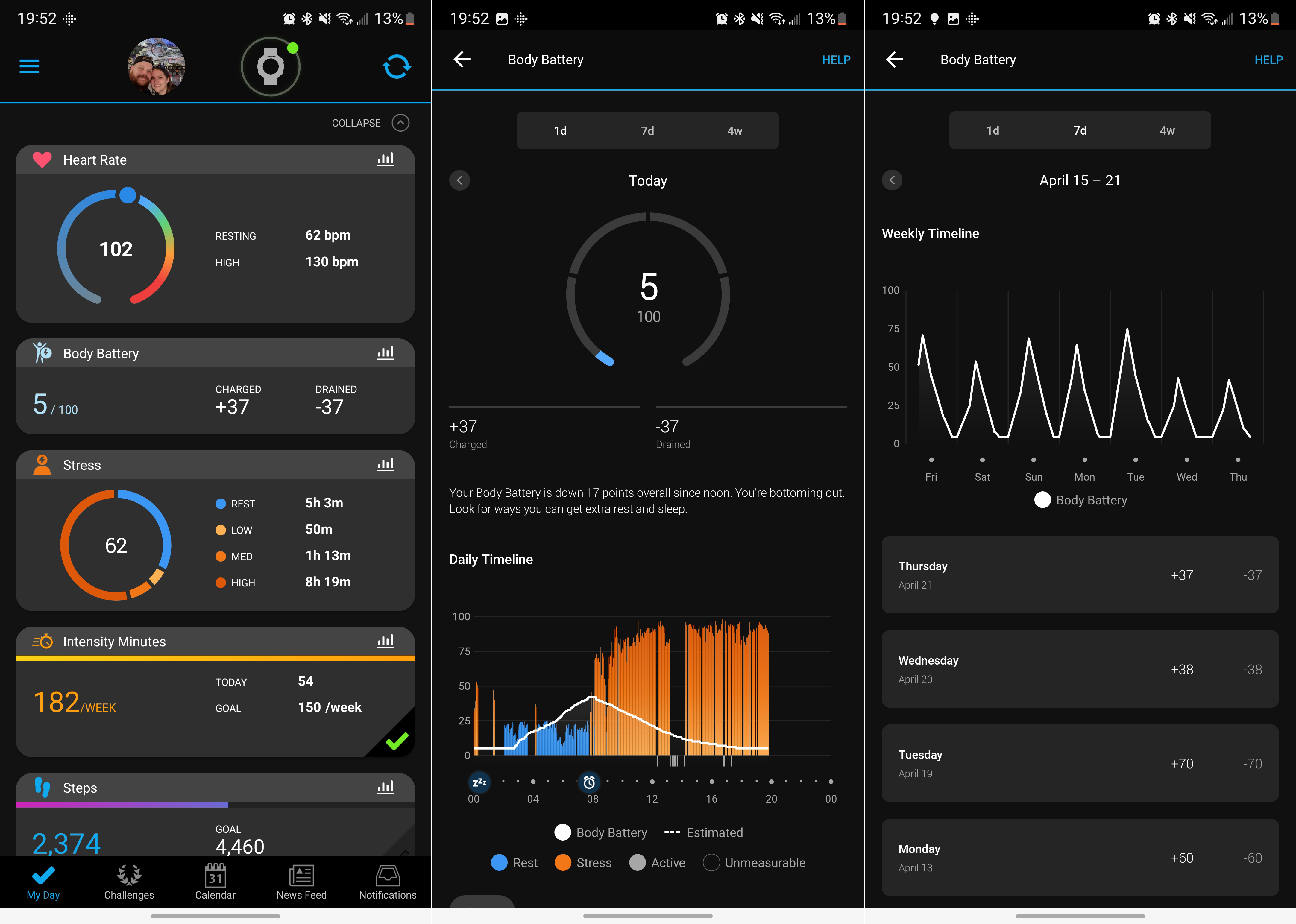
Garmin acquired well-respected physiological data company Firstbeat Analytics in 2020, and uses their algorithms to convert heart rate data into a complete profile of your current health and energy level. It mostly relies on your heart rate variability (HRV) and stress index.
When you're relaxed and healthy, the gap between heartbeats naturally rises while exhaling and falls while inhaling. Calm, deep breathing will correspond with a varied heart rate. But stress or exercise stimulates hormone production that decreases HRV, giving you a more consistent (and elevated) heart rate that will burn through your body battery more quickly.
Get the latest news from Android Central, your trusted companion in the world of Android
First, your body battery will recharge overnight, with Garmin sleep tracking determining how much. Aside from how long and restfully you sleep, the level of recharge will be negatively impacted by certain factors: caffeine or alcohol consumption, extreme temperatures, sickness, and indigestion, for example.
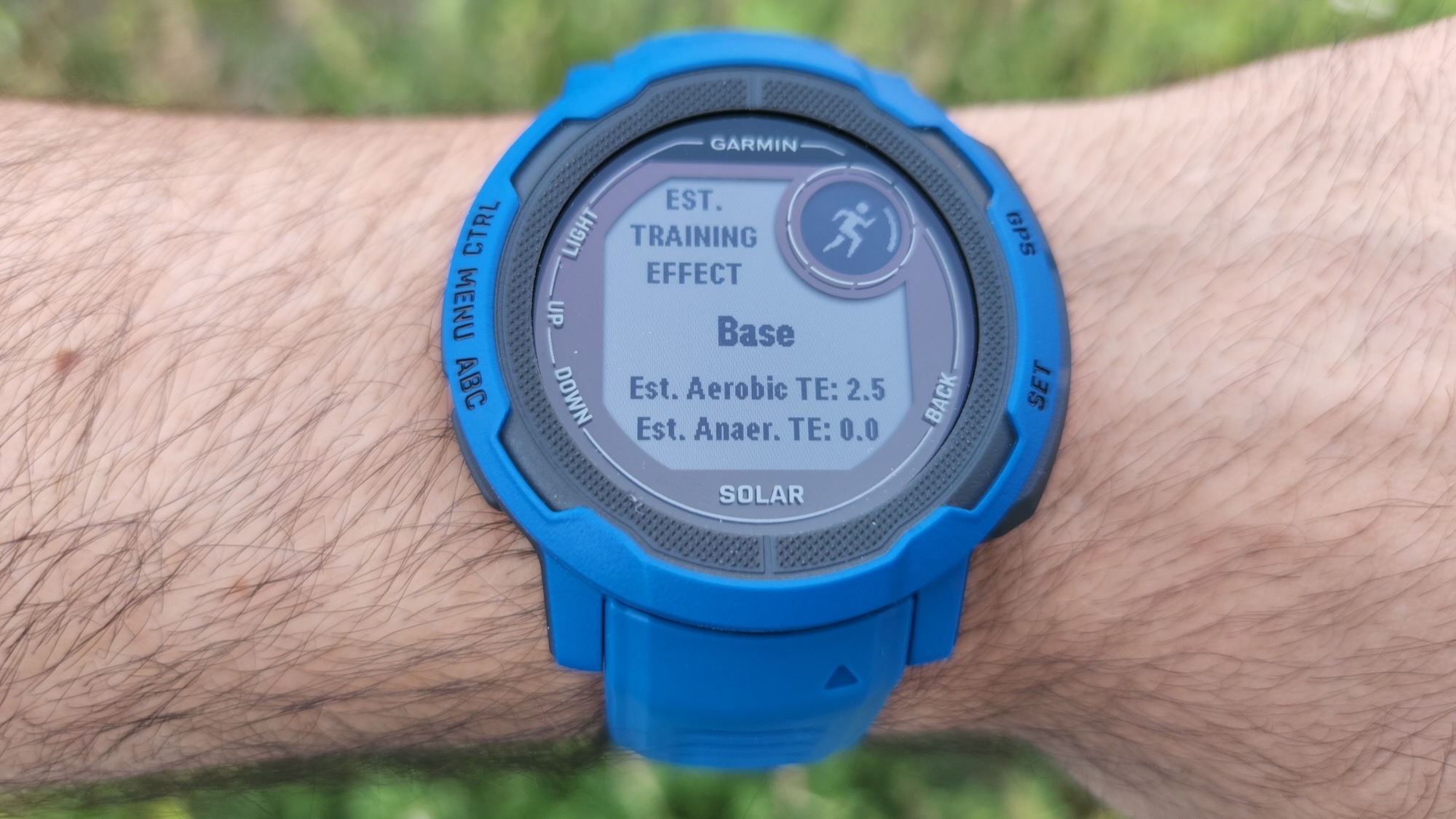
Then, your body battery will naturally drain during the day even if you're sedentary, though it'll obviously drop faster during a workout. Most Garmin watches will also calculate training load, and a workout that's too difficult for your current fitness level will burn through your battery and make your sleep recharge less effective for some time.
If you have a low VO2 Max, for instance, it'll lead to higher Excess Post-exercise Oxygen Consumption (EPOC) that, while good for increasing your fitness level, ensures you need more recovery time in the short term.
Ultimately, a higher body battery score means your body can handle a tougher workout; a lower body battery rating means you should prioritize getting a good night's sleep or find a way to decrease the stressors in your life.
How to find your Garmin Body Battery score
The easiest way to find your Body Battery score is in the Garmin Connect app. In the app, click More > Health Stats > Body Battery, where you can see your energy increases and decreases over the last day, week, or four weeks. You can also tap the left arrow to scroll back through previous four-week spans to see how your Body Battery averages have changed over time.
If you want to check your score on your watch, you'll need to either create a custom watch face that shows your Body Battery score or add the Body Battery at-a-glance widget.
The latter is easiest: simply scroll up once from your main watch face, then down to Edit; scroll to the bottom and select +Add, then look through the alphabetical list until you find Body Battery and select it. Then you'll be able to select the widget to see your current score and Body Battery graph at any time.
To make the Body Battery score visible on your main watch face, open the full Settings menu; on a five-button Garmin, you do this by holding down the up button, but it'll vary by device. Select Watch Face, choose a face, then click Customize > Data and choose a specific spot where you want the score to appear. Scroll through the data options until you find a stick figure next to a sphere with a lightning bolt inside, which is the Body Battery symbol.
Of course, on some of the newer Garmin watches like the Garmin Forerunner 255, you can have the watch show your Body Battery score in a Morning Report that appears on your watch when you wake up, so you don't have to go hunting for it.
Why is my Garmin Body Battery score so low and how do I raise it?
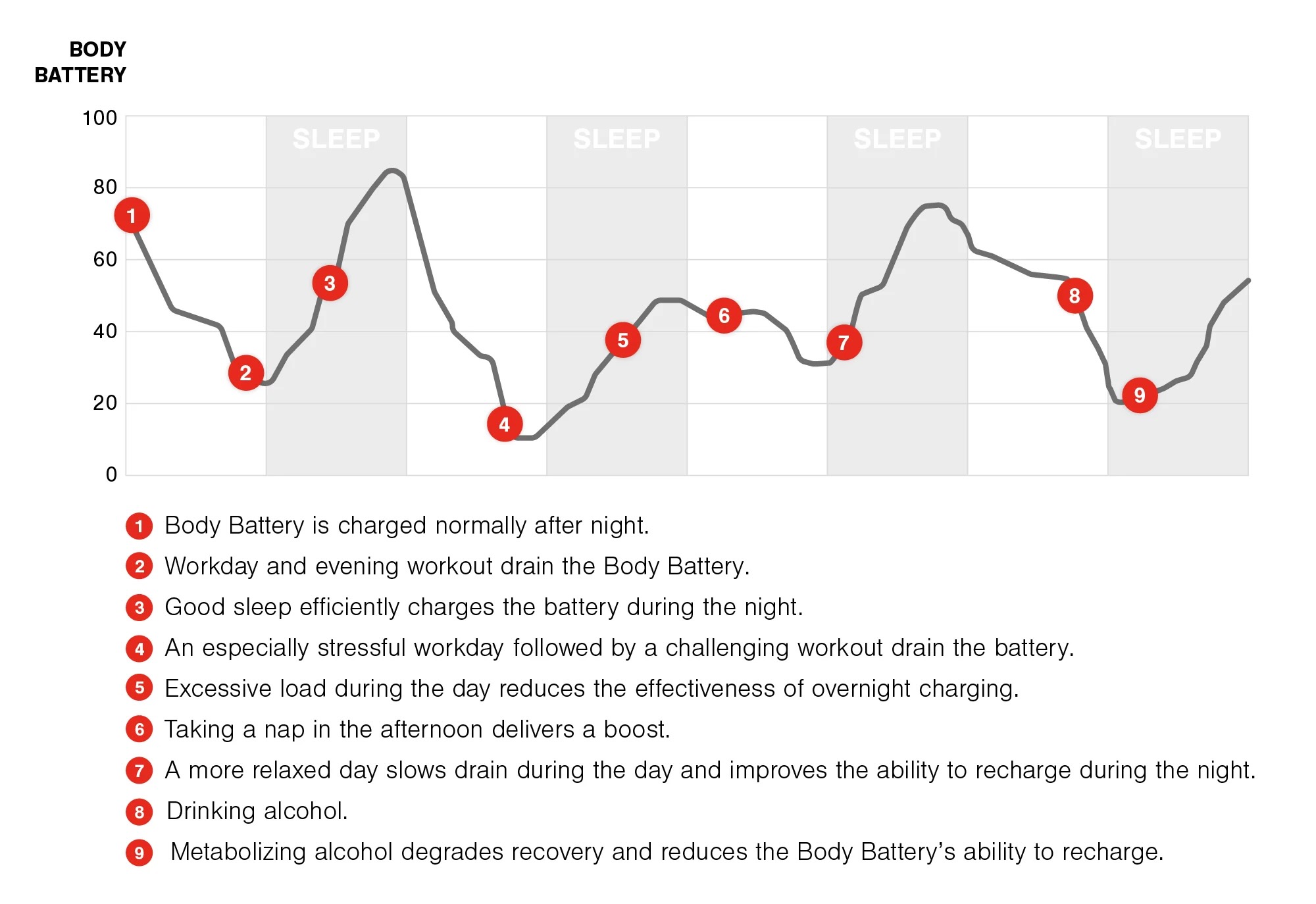
As mentioned above, bad habits will lead to increased drain and reduced charge, while overly taxing workouts will lower your rating and ensure that even a full night's sleep won't recharge it as much as it normally would.
Alcohol consumption or energy drinks will ensure your quality of sleep is lower, hurting your body's ability to regain energy the following day. And if you're constantly stressed due to work during the day, your reduced heart rate variance will ensure you burn through energy at a disproportionate rate.
Aside from making healthier choices, building up your fitness will improve your maximum capacity so that a simple workout won't be as taxing and stressful on your body. Plus, according to the National Library of Medicine, "cardiorespiratory fitness protects against stress-related symptoms of burnout and depression," while another study (via Garmin) found that fitness leads to "less stress during working hours and better nighttime recovery."
Use your Garmin watch to get more fit, and your body battery will naturally recharge faster and better withstand the negative effects of stress.
Which Garmin smartwatches have Garmin Body Battery?
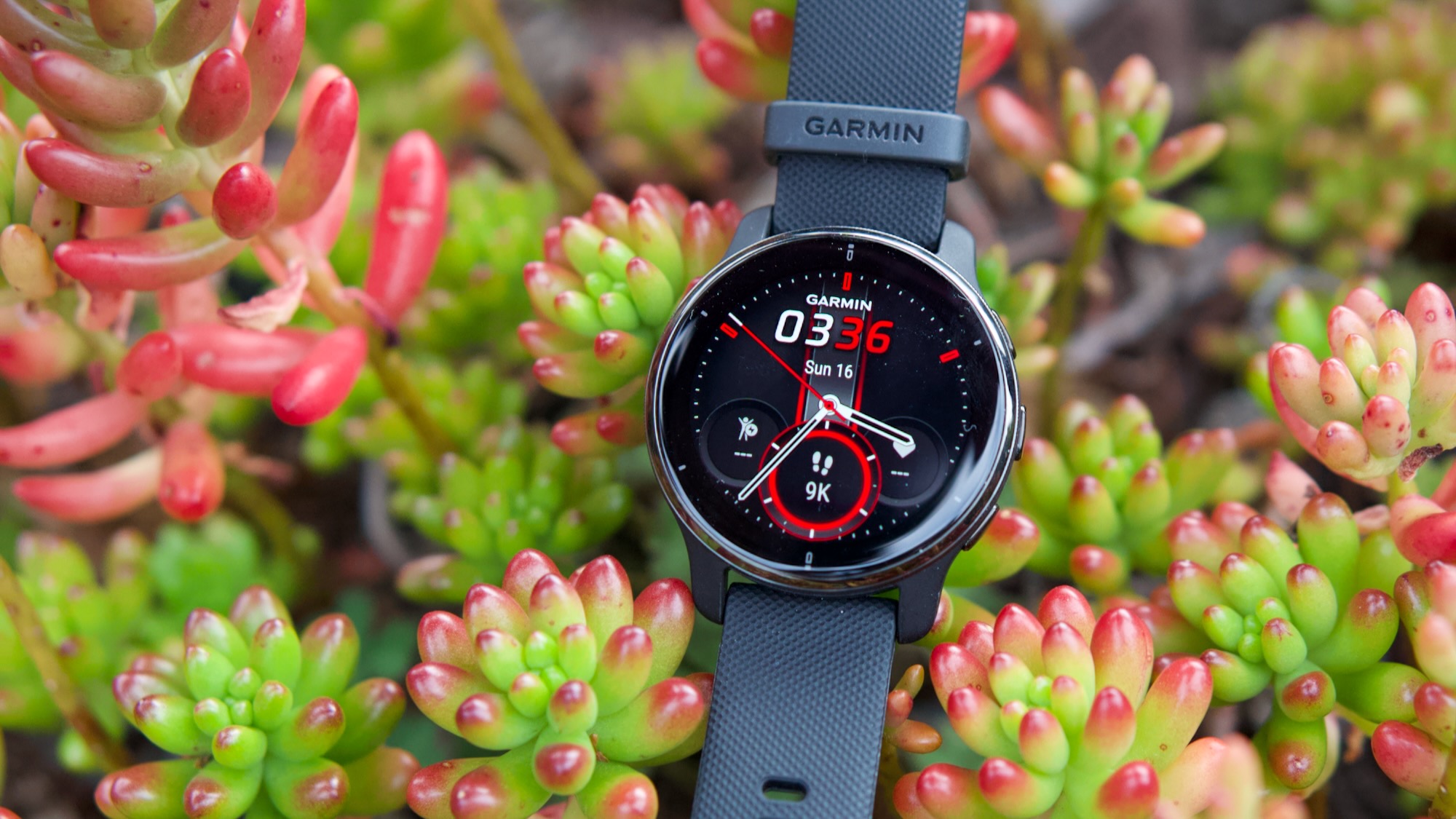
- Approach S62
- D2 Air (X10) / D2 Mach 1
- Descent G1 / Mk2 series
- Enduro series
- epix (Gen 2) series
- fenix 6 / 7 series
- Forerunner 45 / 45S / 55 / 245 / 245 Music / 255 / 745 / 945 (LTE) / 955
- Garmin Swim 2
- Instinct / Instinct 2 / Instinct Crossover series
- Lily series
- MARQ collection
- quatix 6
- tactix 7 / Delta series
- Venu / Venu Sq / Venu 2 / Venu 2 Plus series
- vivoactive 4 / 4S (including Legacy Hero and Saga watches)
- vivosmart 4 / 5
- vivomove 3 series (including Luxe, Sport, and Style watches)
Pretty much all of the best Garmin smartwatches have Garmin Body Battery, in other words.
Just keep in mind that the newest models may give you a more accurate score. 2022 releases like the Instinct 2 Solar and Venu 2 Plus have the Elevate Gen 4 sensor with more accurate heart rate tracking than older watches, for instance. Since Body Battery hinges on HRV to calculate stress, you want the best HRM you can get.
As we mentioned before, watches like the Garmin Forerunner 255 and 955 give you a Morning Report with your Body Battery score and other helpful data like your sleep score, HRV status, local weather, shared calendar events, and your scheduled workout for the day — so we recommend choosing either if you're looking for a new Garmin to track your energy levels, as well as the best running watches we've tested.
Ideally, Garmin Body Battery will spur you on to build better habits and avoid injuring yourself. However, it's only really useful if you wear your watch all day, every day, to get accurate readings. If you only wear your watch during workouts, you'll have to rely on Garmin's other metrics to measure your health.
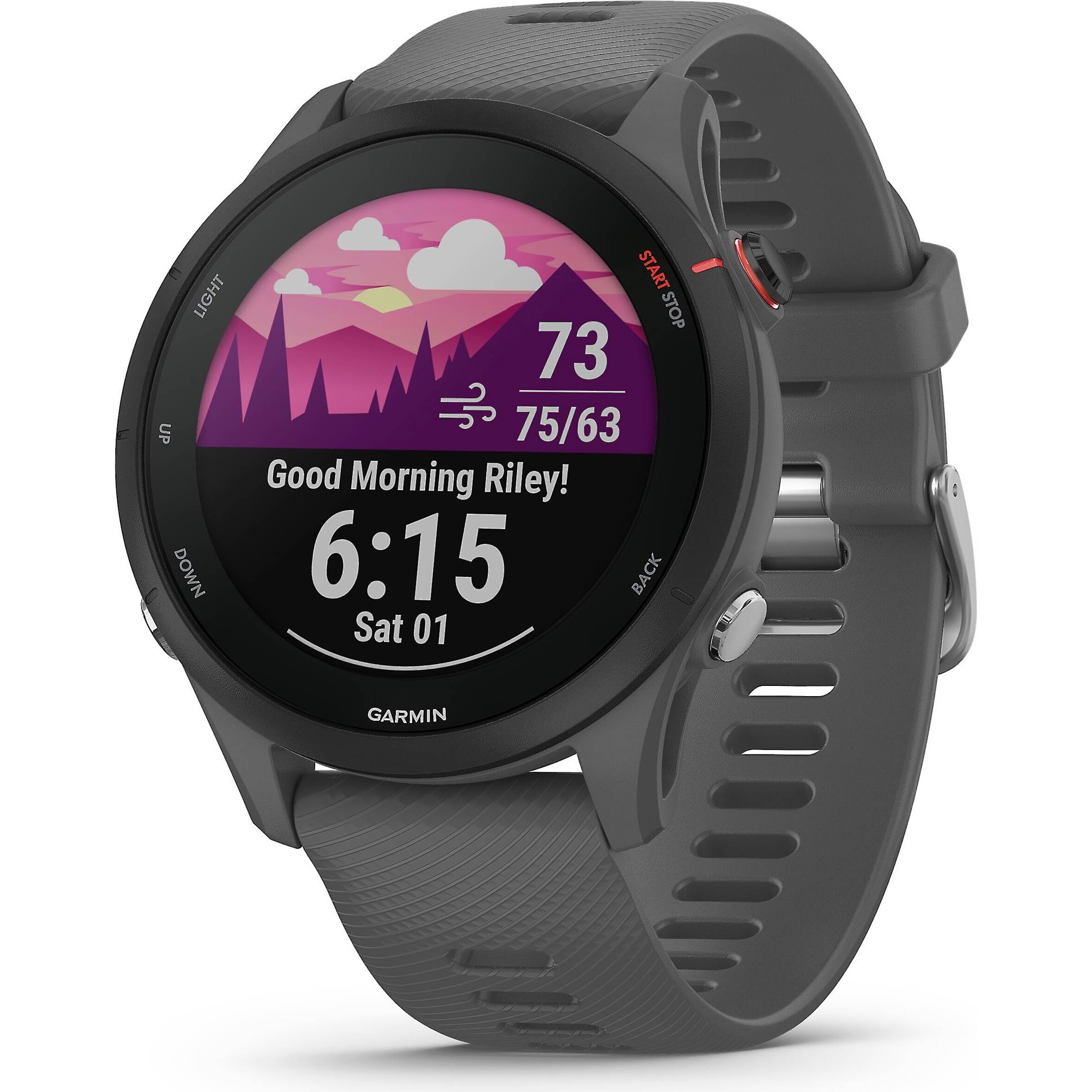
The Garmin Forerunner 255 has all the latest widgets to guide you before, during, and after a workout for runners, cyclists, and swimmers. It can track you with active GPS for 30 hours or measure two weeks of health and Body Battery tracking passively.

Michael is Android Central's resident expert on wearables and fitness. Before joining Android Central, he freelanced for years at Techradar, Wareable, Windows Central, and Digital Trends. Channeling his love of running, he established himself as an expert on fitness watches, testing and reviewing models from Garmin, Fitbit, Samsung, Apple, COROS, Polar, Amazfit, Suunto, and more.
